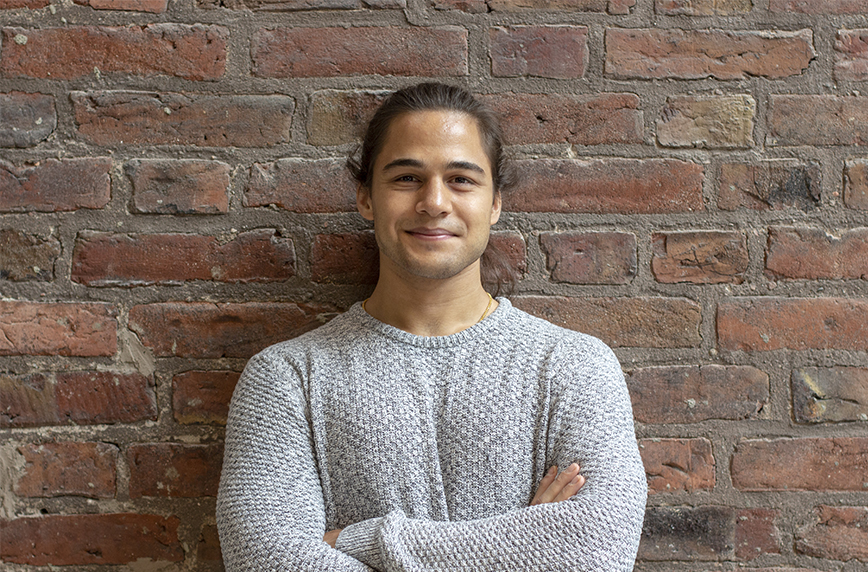Each programme provides flexibility in the choice of courses, such that your interests always have a priority
Balwan comes from Sweden. He specialises in Microwave Engineering and has a great passion for electromagnetic theory. His hobbies include reading and climbing.

Why did you choose this master's programme at KTH?
Throughout my bachelor's degree, I read a whole bunch of courses which, although interesting in their own right, never really caught my attention. For this reason I was thinking of dropping the programme until I came across the course EI1220 Electromagnetic Theory. My fascination with the complexity and existence of electromagnetic fields grew unbound. It resulted in me spending the past three years reading books about electromagnetics over the summer break. Acknowledging my interest in electromagnetic theory, it felt natural to choose the Electromagnetics, Fusion and Space Engineering programme as my master's programme.
What are the best aspects of your programme?
The best aspect of my programme that stands out would be the practical applications of theory that we are introduced to through our courses in terms of labs, projects and assignments. Although rather difficult and tedious, practical tasks help deepen your understanding of theory and its application. Something we don't get very often from reading countless books filled with equations and classical examples.
Another extraordinary aspect would be the international setting of my programme. The diversity of students with different ethnicities, academic backgrounds and experiences provide a unique group dynamic and academic environment. The setting heavily resembles that of industry and in research.
Have you chosen a specialisation track within the programme? If Yes, which track and why?
I chose the specialisation track of Microwave Engineering. The thought of how different applications such as antennas and waveguides make use of electromagnetic fields and how these applications are used in society interested me the most. Ultimately, one could say that my interest in electromagnetic theory motivated my choice of this specialisation track.
What are some of your favourite courses so far?
Apart from the many courses that base themselves around electromagnetic theory, one course that stood out was EI2400 Applied Antenna Theory. The course is built upon introducing applications used in industry and research that have been developed using our current knowledge. The course also included numerous assignments and projects using commercial software and hardware. This gave me insight regarding how vast my current understanding of electromagnetics extends along with how the synthesis and testing of applications work in industry and research. Many of our courses lack hands-on work regarding electromagnetics, which is technically not very easy to do without complicating things. However, this course really throws you in the deep end in this regard with plenty of hands-on projects in a simple and easily understandable fashion.
How does studies at KTH differ from your previous studies?
Since I am enrolled in the 5 year engineering programme within Electrical Engineering, I also completed my bachelor's degree at KTH Campus. If I compare my studies at KTH with those of my high school IEGS*, there is a notable difference in pace and academic difficulty. The studies at KTH are more centred and specific around a given topic, which was not the case for me during my studies at IEGS*. The student life at KTH is also a lot more extensive compared to my previous studies at IEGS*.
How is student life in Stockholm?
Apart from the many activities and events that are ongoing on campus, Stockholm is a very lively city. A major benefit with studying at KTH Campus would be its positioning in central Stockholm, which gives great access to students to partake in the much joy this city has to offer. Everything from the adrenaline filled go-kart racing, to classical bowling and challenging bouldering.
How would you describe your time at KTH so far?
My time at KTH has been quite a rollercoaster. Everything from fun endeavours with my classmates and interesting projects to the endless amount of deadlines of different sorts. I would describe my time at KTH as a memorable period of growth, both as a person and an engineer.
What do you want to do after graduating?
My current interest in electromagnetic theory relating to the next generation antennas and waveguides has motivated me to pursue a PhD within this field further. However, whether I will pursue a PhD in academia or industry is still uncertain.
What would you like to say to students thinking of choosing KTH for master's studies?
For future master's students, KTH is a high-standard technical university with a vast selection of master's programmes. Each programme provides flexibility in the choice of courses, such that your interests always have a priority. The great diversity of students among our master's programmes provide a unique international environment, which gives a sense of equal belonging among students. KTH also provides a lively student experience with loads of activities and events.
*IEGS is an abbreviation for International English Gymnasium at Södermalm.
